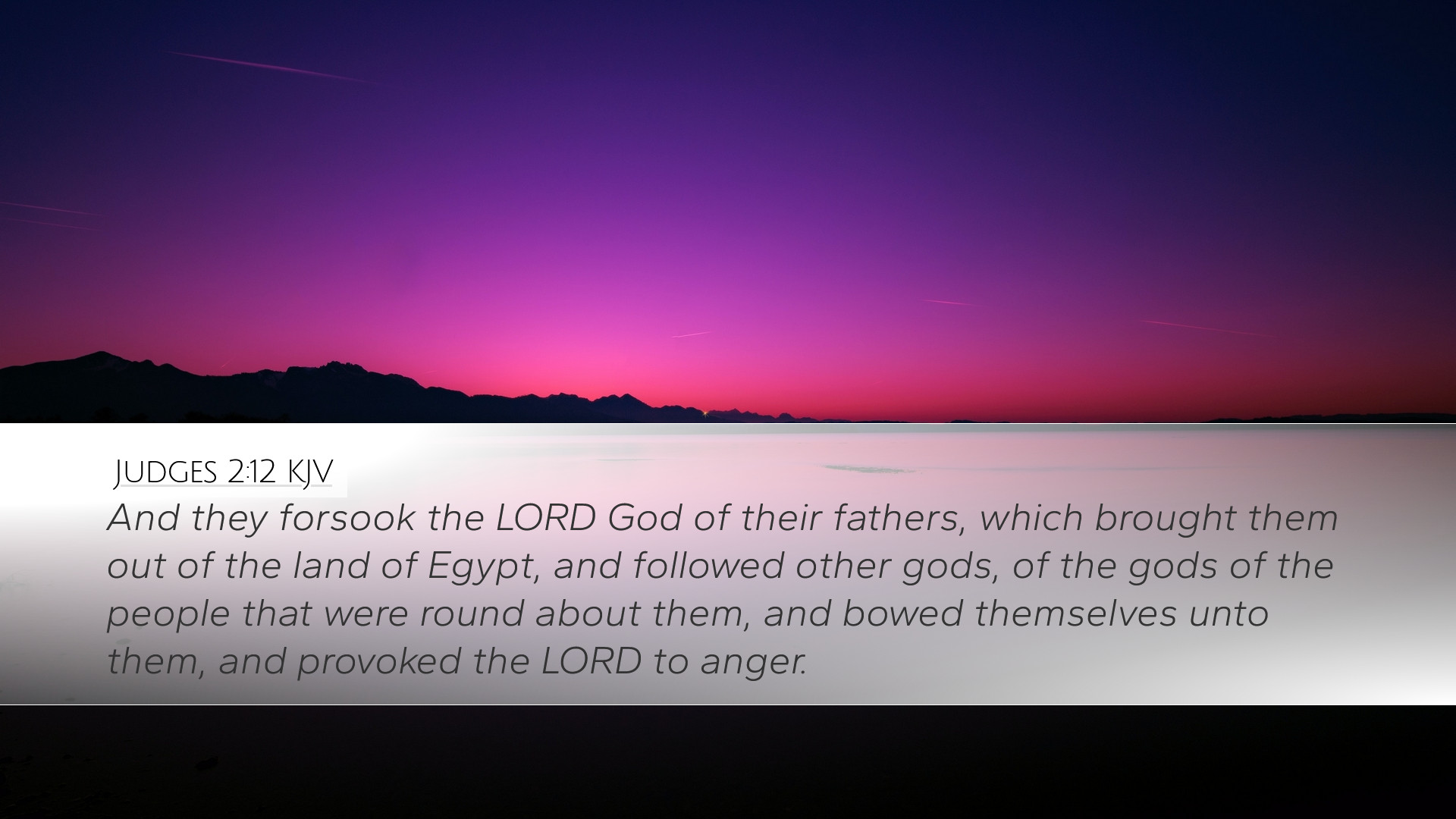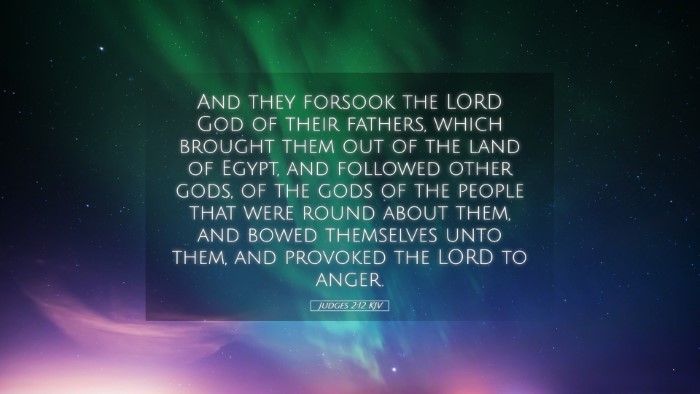Old Testament
Genesis Exodus Leviticus Numbers Deuteronomy Joshua Judges Ruth 1 Samuel 2 Samuel 1 Kings 2 Kings 1 Chronicles 2 Chronicles Ezra Nehemiah Esther Job Psalms Proverbs Ecclesiastes Song of Solomon Isaiah Jeremiah Lamentations Ezekiel Daniel Hosea Joel Amos Obadiah Jonah Micah Nahum Habakkuk Zephaniah Haggai Zechariah MalachiJudges 2:12
Judges 2:12 KJV
And they forsook the LORD God of their fathers, which brought them out of the land of Egypt, and followed other gods, of the gods of the people that were round about them, and bowed themselves unto them, and provoked the LORD to anger.
Judges 2:12 Bible Commentary
Commentary on Judges 2:12
Judges 2:12 states, "And they forsook the Lord God of their fathers, which brought them out of the land of Egypt, and followed other gods, of the gods of the people that were round about them, and bowed themselves unto them, and provoked the Lord to anger." This verse reflects a crucial turning point in the narrative of Israel’s history, highlighting significant themes such as covenant unfaithfulness, idolatry, and divine judgment. The following commentary synthesizes insights from various public domain scholars, including Matthew Henry, Albert Barnes, and Adam Clarke.
Historical Context
The book of Judges encapsulates Israel’s tumultuous history following the conquest of Canaan. After the death of Joshua, Israel was to remain faithful to God’s covenant, yet we see a stark departure from this mandate in Judges 2:12. Matthew Henry refers to this as a tragic turning point, where the Israelites, appointed to lead a life of holiness, fell into idolatry, turning their backs on the very God who had liberated them from slavery in Egypt.
Analysis of Key Themes
-
The Forsaking of the Lord
This forsaking involved a deliberate turning away from God, as emphasized by Albert Barnes. He notes the phrase "forsook the Lord" indicates a rejection of the covenant relationship that Israel had with Yahweh. It symbolizes not merely a neglect of worship but a significant breach in their obligations to God.
-
The Reality of Idolatry
Judges reveals recurring cycles of faithfulness and rebellion. Adam Clarke expounds on the idolatrous practices adopted by the Israelites, who, influenced by the surrounding nations, turned to worship "the gods of the people that were round about them." This indicates the ease with which cultural influences infiltrate spiritual commitments, often leading believers astray from their foundations.
-
Provocation of Anger
The text concludes with the serious consequence of this idolatry—provoking the Lord to anger. As Matthew Henry notes, divine anger is the rightful response to such betrayal. The gravity of this action invokes serious considerations regarding God’s holiness and justice in the face of persistent disobedience.
Theological Implications
This verse calls believers today to reflect deeply on their commitments to God. The covenantal relationship that Israel had with God serves as a paradigm for understanding the contemporary Christian faith. The expulsion of the divine presence due to sin is a sobering reminder that idolatry, in any form, disrupts the relationship between God and humanity.
Faithfulness and Covenant
Matthew Henry observes that God's covenant reflects His unchanging faithfulness, in contrast to human frailty. This serves as a stark reminder that faithfulness should not merely exist in a historical context but should carry into personal and communal experiences today.
Impact of Cultural Influences
Albert Barnes discusses how Israel's interaction with surrounding nations provides insight into the potential risks of cultural assimilation. The challenge persists for modern believers to discern and resist cultural norms and values that contradict biblical teachings. This verse emphasizes the necessity of vigilance regarding one's spiritual and communal identity.
The Consequences of Unfaithfulness
The provocation of anger is a significant theme in this verse that recalls the severity of God's responses to unfaithfulness. Adam Clarke elaborates on this theme, underscoring that God’s judgment is not capricious but rather a measure of divine justice reacting to a betrayal of trust and relationship. The historical narrative warns both individuals and communities of the gravity of apostasy.
Practical Reflections
For pastors, students, theologians, and Bible scholars, Judges 2:12 provides significant material for reflection on the nature of faithfulness in the contemporary Christian context.
-
Self-Examination
It invites believers to conduct a self-examination regarding areas of compromise in their lives and communities. In which ways are modern Christians influenced by surrounding cultures to forsake their faith?
-
The Role of Leadership
This passage also raises critical questions about leadership within the church. How can spiritual leaders guide their communities to remain faithful to God amidst societal pressures?
-
Encouragement for the Faithful
Finally, this verse serves as encouragement for those who strive to remain faithful. They are reminded of the blessings associated with fidelity to God and the potential consequences of turning away from Him.
Conclusion
Judges 2:12 is a pivotal verse that encapsulates the danger of spiritual complacency and the ease of cultural drift into idolatry. The commentary from historical scholars sheds light on the timeless truths contained within this text, encouraging a fervent commitment to God’s covenant in all areas of life. As we reflect on this verse, may it prompt a renewed dedication to maintaining a steadfast faith in a world often tumultuous and full of distractions.


